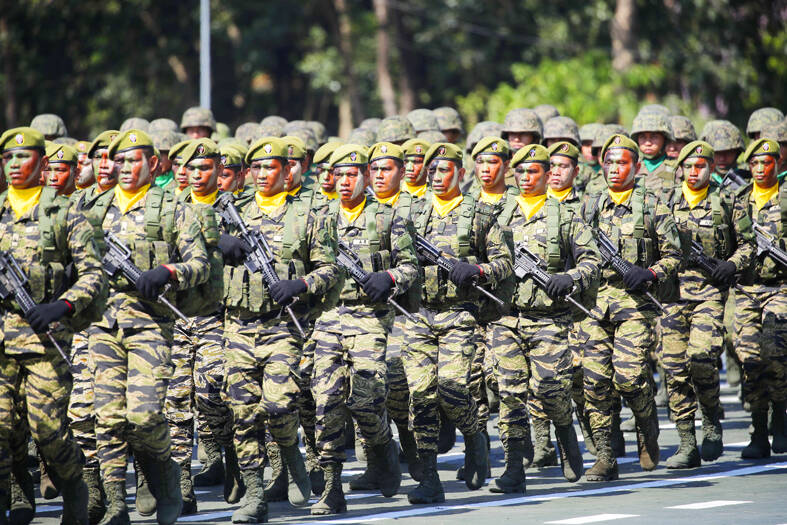Philippine President Ferdinand Marcos Jr yesterday said the US would gain expanded access to military sites in northern Philippines close to Taiwan, as well as in Palawan province near South China Sea, paving the way for greater US presence in key locations as tensions with Beijing linger.
Marcos said at a televised briefing that the four additional sites under the Enhanced Defense Cooperation Agreement (EDCA) are “scattered around the Philippines” and would be identified once formalized with the US.
The new sites are meant to “defend” the main Luzon island’s eastern coast, as well as some areas in the south, the president said.

Photo: EPA-EFE
Local politicians who initially opposed the sites have “come around to support” the plan to expand US access after talks with the national government, he added.
Governor Manuel Mamba of Cagayan Province, where US forces might be allowed to stay with their weapons in up to two Philippine military areas, said Marcos has the prerogative to make the decision.
However, he added that he remained opposed to allowing the Americans to base in Cagayan, which lies across a sea border from southern China and Taiwan, because that could turn his province into a key target of the Chinese military if an armed conflict involving the US military breaks out over Taiwan.
“It is the president’s call, not mine,” Mamba said. “But I maintain my stand against any foreign forces stationed in my province. Still, I am against EDCA sites in my province.”
In Beijing, Chinese Ministry of Foreign Affairs spokesman Wang Wenbin (汪文斌) said that regional countries “should stay vigilant and should not be used by the US side.”
“The US, out of its zero sum mentality, has built up its military capacity, which jeopardizes the regional peace and stability,” he told a regular news briefing.
The US last month secured access to four more Philippine military sites amid continued tensions with Beijing over Taiwan and the South China Sea.
China has criticized the plan, with its embassy in Manila describing it as part of US’ attempt to “encircle and contain” Beijing.
Marcos has been bolstering his nation’s longstanding defense alliance with the US that was strained under his predecessor, Rodrigo Duterte. The US and the Philippines are planning joint patrols in the disputed sea, and are scheduled to hold bigger military drills next month. Their top defense officials and diplomats are also set to meet in Washington in the middle of next month.

CHAMPIONS: President Lai congratulated the players’ outstanding performance, cheering them for marking a new milestone in the nation’s baseball history Taiwan on Sunday won their first Little League Baseball World Series (LLBWS) title in 29 years, as Taipei’s Dong Yuan Elementary School defeated a team from Las Vegas 7-0 in the championship game in South Williamsport, Pennsylvania. It was Taiwan’s first championship in the annual tournament since 1996, ending a nearly three-decade drought. “It has been a very long time ... and we finally made it,” Taiwan manager Lai Min-nan (賴敏男) said after the game. Lai said he last managed a Dong Yuan team in at the South Williamsport in 2015, when they were eliminated after four games. “There is

Chinese Nationalist Party (KMT) lawmakers have declared they survived recall votes to remove them from office today, although official results are still pending as the vote counting continues. Although final tallies from the Central Election Commission (CEC) are still pending, preliminary results indicate that the recall campaigns against all seven KMT lawmakers have fallen short. As of 6:10 pm, Taichung Legislators Yen Kuan-heng (顏寬恒) and Yang Chiung-ying (楊瓊瓔), Hsinchu County Legislator Lin Szu-ming (林思銘), Nantou County Legislator Ma Wen-chun (馬文君) and New Taipei City Legislator Lo Ming-tsai (羅明才) had all announced they

Nvidia Corp CEO Jensen Huang (黃仁勳) yesterday visited Taiwan Semiconductor Manufacturing Co (TSMC, 台積電), as the chipmaker prepares for volume production of Nvidia’s next-generation artificial intelligence (AI) chips. It was Huang’s third trip to Taiwan this year, indicating that Nvidia’s supply chain is deeply connected to Taiwan. Its partners also include packager Siliconware Precision Industries Co (矽品精密) and server makers Hon Hai Precision Industry Co (鴻海精密) and Quanta Computer Inc (廣達). “My main purpose is to visit TSMC,” Huang said yesterday. “As you know, we have next-generation architecture called Rubin. Rubin is very advanced. We have now taped out six brand new

POWER PLANT POLL: The TPP said the number of ‘yes’ votes showed that the energy policy should be corrected, and the KMT said the result was a win for the people’s voice The government does not rule out advanced nuclear energy generation if it meets the government’s three prerequisites, President William Lai (賴清德) said last night after the number of votes in favor of restarting a nuclear power plant outnumbered the “no” votes in a referendum yesterday. The referendum failed to pass, despite getting more “yes” votes, as the Referendum Act (公民投票法) states that the vote would only pass if the votes in favor account for more than one-fourth of the total number of eligible voters and outnumber the opposing votes. Yesterday’s referendum question was: “Do you agree that the Ma-anshan Nuclear Power Plant